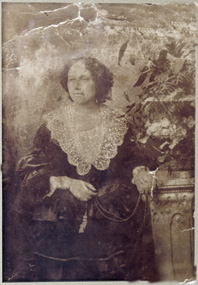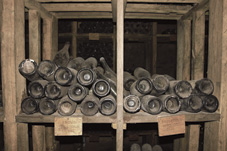
Aleksandre Chavchavadze - Country of Liquid Sun
Tuesday, April 7
Aleksandre Chavchavadze's family was the most important cultural centre in Georgia during the first half of the nineteenth century. His large family-himself, his wife Salome and their four children Nino, Ekaterine, David and Sopo lived in Tbilisi and at their Tsinandali estate which was their summer residence. Georgian writers and public figures frequently visited their home where they used to arrange literature and musical evenings, theatrical performances and discussions about social issues. The first grand piano, first piano, the first phaeton, the first collection European wines and, generally, the first European seat in Georgia were all at the estate of Aleksandre Chavchavadze, the founder of Georgian Romanticism. According to Iona Meunargia, the idea of the first permanent Georgian theatre emerged in Chavchavadze's family where they formed a small circle of amateur actors under his leadership. In that period, he translated Pierre Corneille's Le Cid and even prepared a family performance in which Chavchavadze played one of the key characters although the performance was, in the end, not staged for reasons which are not known.
Initially, the Chavchavadzes possessed estates in Tsinandali and Mukuzani. Later, Erekle Il granted Garsevan Chavchavadze the villages of Zegani, Napareuli and Mughanlo, in Kakheti, together with the villagers living there for faithful and devoted service. Aleksandre further strengthened Garsevan's possessions and turned them into a cultural economy. According to legend, the great Pushkin, whom Aleksandre befriended in Tbilisi in 1829, was enamored by the beautiful view of the Kakhiskhevi River and Caucasus Mountains as seen from Chavchavadze's estate. The palace in Tsinandali was surrounded by a decorative park with an alley- way lined with evergreens. This dendrological park, with its versatility, well fit with the environment and is evidence of Chavchavadze's esthetics and fine taste. The park, together with the facilities and nursery, is located on 12 hectares of land. 150 of the 400 species trees are exotic. Amongst them are Japanese medlars and quinces, persimmons, olives, paper-trees, New Zealand fruits, coniferous trees, cork oaks, camphor trees and others.
Aleksandre Chavchavadze produced fine wines from the grapes of traditional Georgian varieties; namely, Rkatsiteli, Saperavi, Mtsvane and Khikhvi. It is known that he yielded over 60.00 roubles from his estates and made great efforts to expand his economy. One ne of the first large wine distilleries was built at the Tsinandali estate as early as in 1835 which still houses the unique ethnotheque of 20,000 bottles of wine made in various countries.
Aleksandre Chavchavadze died suddenly and tragically in 1846. He was on his way to a ball at the home of Governor General Vorontsov. Suddenly his in a horse in and carriage became frightened and the coat of Alexandre was curved by the wheel of the carriage accident. On the third day after his death, the whole population of Tbilisi paid its last tribute to a great poet and public figure. He was buried in Kakheti, at the Shuamta.
Later, a great tragedy occurred for the Chavchavadze family when Shamil's forces invaded Kakheti in the summer of 1854 and ruined Eniseli, Shilda, Gremi and burned the town On 4 July, Shamil's son Kazi Mohammad unexpectedly attacked the of Telavi. Chavchavadze estate, burned the palace in Tsinandali and captured David's wife and children, close relatives who were there and several servants - 24 people altogether. At a time of the attack, Shamil's soldiers killed David's youngest child, one-year old Lidia. In 1855, after extensive negotiations, Shamil exchanged the hostages for his son Jamal ed-Din who had been captured by the Russians. He received 16 captives in all and a large sum of money as ransom. David Chavchavadze pledged Tsinandali, Mukuzani and Napareuli in order to raise the money for Shamil.
After returning from the captivity in 1856, David Chavchavadze and his family continued to live at the palace in Tsinandali although he had to transfer his entire property to the Prince's Department because of debts. This included the estates, their land, the vineyards and the facilities and their inventories. By the end, all that was left was the palace in Tsinandali as a temporary residence for Anna Chavchavadze, David's spouse.
The Tsinandali Palace, which is now a museum in honour of the great poet and public figure, Aleksandre Chavchavadze, was restored and reconstructed between 1886 and 1887. The wine cellar and factory, with a capacity of 150,000 barrels, were also constructed at this time. The park was restored in 1887 by the Swede, Arnold Reggel. The Chavchavadze estate was restored for the Russian Emperor's family and served as a it was some kind of residence in Tsinandali.




